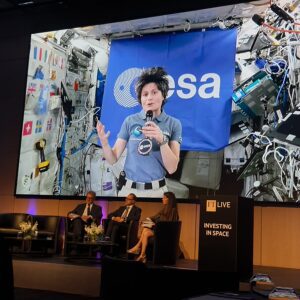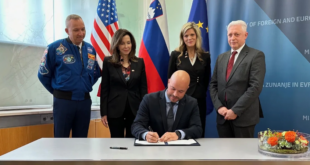
The FT Live conference on Investing in Space was held in London on the 8th and 9th of June 2022, a live and digital conference promoted by the Financial Times focused on the financial and private investors opinion on the space industry. Sponsored by ViaSat and BAE Systems among others, and with the support of ESA and the UK Space agency, it showcased an astonishing number of superstars in our sector (Bill Nelson, Josef Aschbacher and Samantha Cristoforetti to name just three) together with important representatives from the UK government (George Freeman, UK Minister for Science, Research and Innovation among the others) and of course from the private venture sector (Mark Boggett, CEO of Seraphim Space, Richard Baldrige, CEO of ViaSat, Chris MaLaughlin, Chief of Government from OneWeb, Mary Lynn Dittmar, Executive Vice President of Axiom Space, and many others).
It was interesting to hear for the first time an overall “financial point of view” of the Space industry. On one hand this conference confirms what was already known, that the Space sector has gone mainstream. On the other hand, it highlights gaps and sensitive issues that should be addressed in the dialogue between agencies, government and private investors. One of the details that has arisen is that some private investors and government bodies are not so acquainted with the technicality and needs of the space sector: they want a slice of the pie but they don’t know the ingredients nor how it has been made. Too often colorful but empty words were used – climate change and sustainability on the top of the list- and even more often some policy bodies seemed unaware of how the sector operates in first place: the need for components, the long chain of bureaucracy inherent with global trade, the permitting involved in making these components and exporting them between countries, even among allies. In that sense it is crucial that Space agencies, albethey interested parties and not impartial, lead the way in explaining what can be done, what are the requirements and give substance to the concrete projects that will be developed in the future.
Overall, the connection between agencies, government bodies and private investors appears still to be raw: not because of the lack of desire to collaborate with each other, but more for the lack of a clear understanding on how to reconcile not-always mutual interests, or at least how to find a way to do this for the global good. Agencies want private sector investments to develop projects that can be applied to society, because that’s what agencies do. This includes Earth monitoring and green policies. However, the private investors seem less enthusiastic for the public good perspective, and more interested in the capital deriving from straight-forward, direct-reward activities, like satcom and downstream services. Agencies, as yet, seem unprepared to explain to the private sector how they can have a return from investing in sustainable projects. Governments want the space sector to be the top industry promoting and driving the economic growth of the next 50 years. However, they would also like the sector to be a promoter of national growth rather than global wealth, which goes against one of the basic principles of Space: it’s universal by definition, it’s everywhere, and it has no boundary.
It is crucial that Space agencies, albethey interested parties and not impartial, lead the way in explaining what can be done.
In the future it will be hard to reconcile national interests with the necessity of global unilateral collaborations. It will be hard because it’s costly to go into space without the support of other nations, because it’s messy not to collaborate with nations that can provide you with basic components, and because Space needs global regulations dictated by neutral parties. The line between interested collaboration and conflict is easily crossed, and only with global agreements that unify interests from a humanity perspective, rather than a single nation perspective, can we hope to satisfy the needs of western governments to use space to relaunch our nations, to go faster into the next century, and peacefully to explore our universe for the benefits of humanity.
The #SpaceWatchGL Opinion: FT special is a series of in-depth articles discussing the topics raised during the 2022 Financial Time Investing in Space conference. While they provide with some summaries and details about the conference, they aim at expanding the context of the conference and inserting it into the broader discussion occurring within the Space sector on relevant issues and ongoing debates.
#SpaceWatchGL Opinion: New Space Domain Economics
by Sabine Pongruber
#SpaceWatchGL Opinion: Can Sustainability generate profit?
by Dr. Emma Gatti
 SpaceWatch.Global An independent perspective on space
SpaceWatch.Global An independent perspective on space







